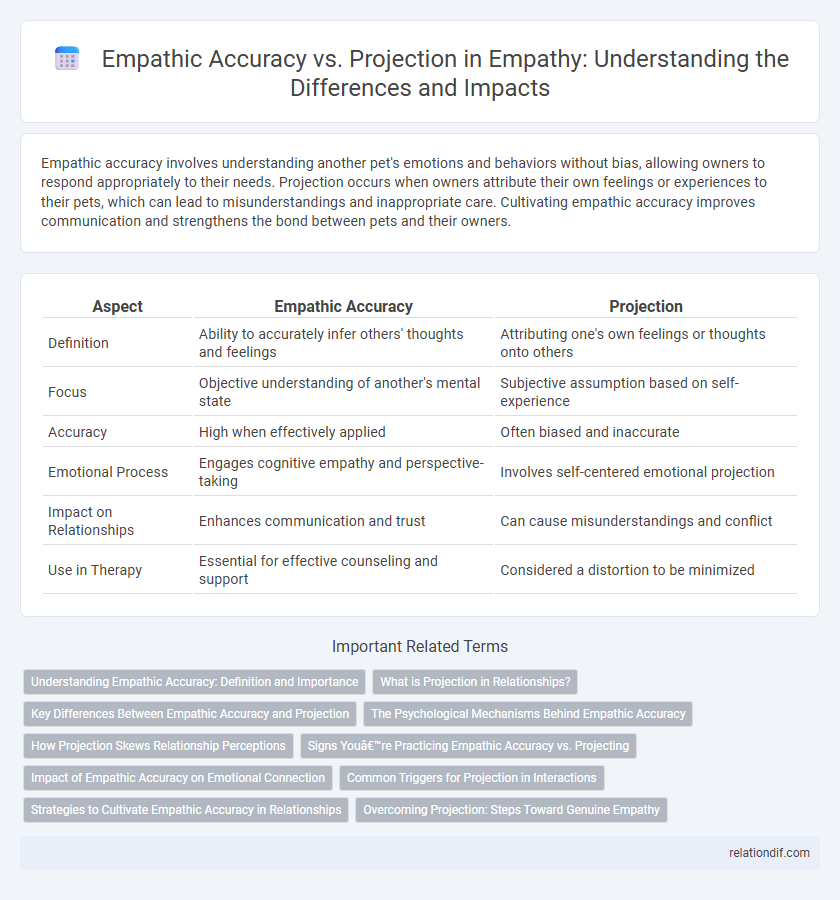Empathic accuracy involves understanding another pet's emotions and behaviors without bias, allowing owners to respond appropriately to their needs. Projection occurs when owners attribute their own feelings or experiences to their pets, which can lead to misunderstandings and inappropriate care. Cultivating empathic accuracy improves communication and strengthens the bond between pets and their owners.
Table of Comparison
| Aspect | Empathic Accuracy | Projection |
|---|---|---|
| Definition | Ability to accurately infer others' thoughts and feelings | Attributing one's own feelings or thoughts onto others |
| Focus | Objective understanding of another's mental state | Subjective assumption based on self-experience |
| Accuracy | High when effectively applied | Often biased and inaccurate |
| Emotional Process | Engages cognitive empathy and perspective-taking | Involves self-centered emotional projection |
| Impact on Relationships | Enhances communication and trust | Can cause misunderstandings and conflict |
| Use in Therapy | Essential for effective counseling and support | Considered a distortion to be minimized |
Understanding Empathic Accuracy: Definition and Importance
Empathic accuracy refers to the ability to accurately infer the specific thoughts and feelings of others, distinguishing it from projection, which involves attributing one's own emotions to someone else. This skill is crucial in enhancing interpersonal relationships by fostering genuine understanding and reducing misunderstandings. Research in social psychology highlights empathic accuracy as a key predictor of effective communication and emotional intelligence.
What is Projection in Relationships?
Projection in relationships occurs when individuals unconsciously attribute their own thoughts, feelings, or motives onto their partners, often distorting reality and causing misunderstandings. This psychological defense mechanism interferes with empathic accuracy by replacing genuine emotional insight with biased assumptions. Recognizing projection helps improve communication and fosters deeper emotional connection by encouraging honest self-reflection and empathy.
Key Differences Between Empathic Accuracy and Projection
Empathic accuracy involves accurately perceiving and understanding others' emotions and thoughts based on observable cues, while projection occurs when one attributes personal feelings or beliefs onto someone else without objective validation. The key difference lies in motivation and outcome: empathic accuracy seeks truthful emotional insight through careful observation and validation, whereas projection reflects self-centered bias, often leading to misinterpretation. Studies in social cognition emphasize that empathic accuracy enhances interpersonal communication and relationship satisfaction, whereas projection can distort social interactions and reduce empathy effectiveness.
The Psychological Mechanisms Behind Empathic Accuracy
Empathic accuracy involves accurately perceiving another person's thoughts and feelings through cognitive and affective mechanisms such as perspective-taking and emotional resonance, whereas projection occurs when individuals mistakenly attribute their own emotions or beliefs to others. Mirror neuron systems and theory of mind processes underpin empathic accuracy by enabling the simulation and understanding of others' internal states without conflation from personal biases. Neural activity in brain regions like the medial prefrontal cortex and temporoparietal junction supports discerning self from other, which reduces projection errors and enhances genuine empathic insight.
How Projection Skews Relationship Perceptions
Projection skews relationship perceptions by distorting an individual's understanding of others' feelings, causing inaccurate assumptions based on personal emotions rather than actual cues. This cognitive bias leads to misunderstandings, as one imposes their own thoughts and motives onto another, compromising empathic accuracy. Consequently, relationships suffer from misaligned expectations and diminished trust when projections replace genuine emotional insight.
Signs You’re Practicing Empathic Accuracy vs. Projecting
Recognizing clear, specific emotions and behaviors in others signals empathic accuracy, whereas attributing personal feelings or assumptions indicates projection. Empathic accuracy involves attentive listening and validating others' experiences without filtering through your own biases. Signs include accurately describing others' perspectives versus imposing your own narratives onto their emotions.
Impact of Empathic Accuracy on Emotional Connection
Empathic accuracy significantly enhances emotional connection by enabling individuals to accurately perceive and understand others' feelings, fostering trust and deeper relational bonds. Unlike projection, which involves attributing one's own emotions to others and can lead to misunderstandings, empathic accuracy promotes genuine communication. Research in social psychology highlights that high empathic accuracy reduces conflict and increases emotional intimacy in personal and professional relationships.
Common Triggers for Projection in Interactions
Common triggers for projection in interactions include unresolved personal conflicts, fear of judgment, and emotional vulnerability. These triggers distort empathic accuracy by causing individuals to attribute their own feelings or motives to others, leading to misinterpretations. Recognizing these triggers enhances true empathy by fostering clearer perception and reducing bias in social exchanges.
Strategies to Cultivate Empathic Accuracy in Relationships
Empathic accuracy, the ability to accurately understand others' thoughts and feelings, differs from projection, which involves attributing one's own emotions onto others. Strategies to cultivate empathic accuracy include active listening, seeking clarifying questions, and practicing perspective-taking to reduce biases and assumptions. Consistent emotional validation and mindfulness enhance connection by fostering genuine understanding and minimizing projection errors.
Overcoming Projection: Steps Toward Genuine Empathy
Overcoming projection requires cultivating awareness of one's own biases and emotional states to prevent misattributing feelings to others. Practicing active listening and seeking clarification helps distinguish authentic emotions from assumed ones, enhancing empathic accuracy. Consistent self-reflection and mindfulness contribute to genuine empathy by fostering a clear understanding of another's experience without the interference of personal projections.
Empathic accuracy vs projection Infographic

 relationdif.com
relationdif.com